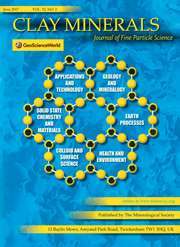Article contents
Quantitative mineralogical analysis of ‘blue clay’ from vonšov, bohemia: a comparative study by nine laboratories
Published online by Cambridge University Press: 14 March 2018
Abstract
Samples of ‘blue clay’ were distributed among nine laboratories in various countries to assess the possibility of quantitative mineralogical determination. The disordered form kaolinite commonly found in fireclays and illite, or mica, were found by all laboratories, as was a material variously described as montmorillonite, swelling material (vermiculite, beidellite or open illite), or intermediate or swelling illite. The next most abundant mineral was quartz. Opal, chlorite, felspar, anatase, and organic matter, all in small quantities, were not all found by any laboratory and traces of calcite and dolomite were observed in one only. The most effective procedure is discussed, and it is concluded that the results are of a semi-quantitative rather than a quantitative nature.
- Type
- Research Article
- Information
- Copyright
- Copyright © The Mineralogical Society of Great Britain and Ireland 1963
References
- 4
- Cited by


